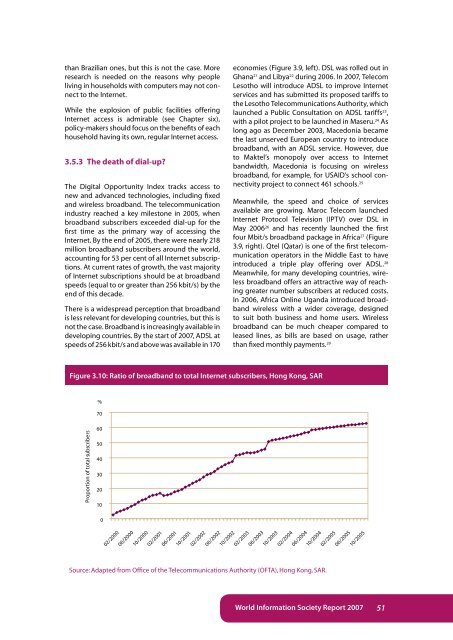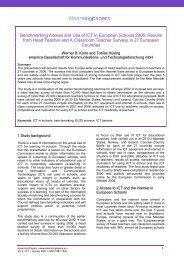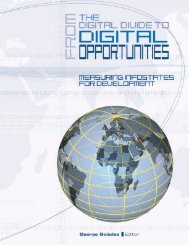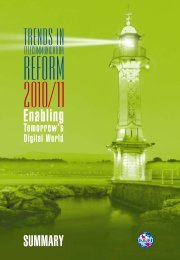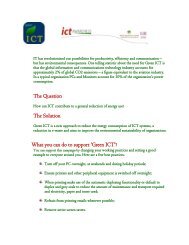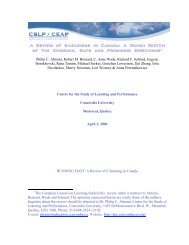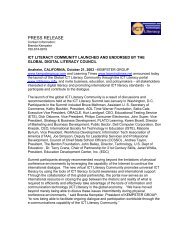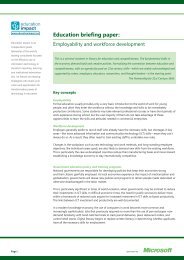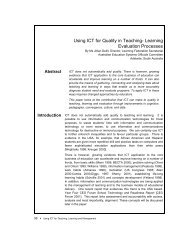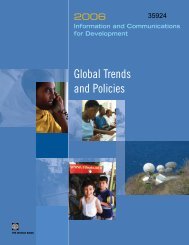The Digital Opportunity Index (DOI) - ITU
The Digital Opportunity Index (DOI) - ITU
The Digital Opportunity Index (DOI) - ITU
You also want an ePaper? Increase the reach of your titles
YUMPU automatically turns print PDFs into web optimized ePapers that Google loves.
than Brazilian ones, but this is not the case. More<br />
research is needed on the reasons why people<br />
living in households with computers may not connect<br />
to the Internet.<br />
While the explosion of public facilities offering<br />
Internet access is admirable (see Chapter six),<br />
policy-makers should focus on the benefits of each<br />
household having its own, regular Internet access.<br />
3.5.3 <strong>The</strong> death of dial-up?<br />
<strong>The</strong> <strong>Digital</strong> <strong>Opportunity</strong> <strong>Index</strong> tracks access to<br />
new and advanced technologies, including fixed<br />
and wireless broadband. <strong>The</strong> telecommunication<br />
industry reached a key milestone in 2005, when<br />
broadband subscribers exceeded dial-up for the<br />
first time as the primary way of accessing the<br />
Internet. By the end of 2005, there were nearly 218<br />
million broadband subscribers around the world,<br />
accounting for 53 per cent of all Internet subscriptions.<br />
At current rates of growth, the vast majority<br />
of Internet subscriptions should be at broadband<br />
speeds (equal to or greater than 256 kbit/s) by the<br />
end of this decade.<br />
<strong>The</strong>re is a widespread perception that broadband<br />
is less relevant for developing countries, but this is<br />
not the case. Broadband is increasingly available in<br />
developing countries. By the start of 2007, ADSL at<br />
speeds of 256 kbit/s and above was available in 170<br />
economies (Figure 3.9, left). DSL was rolled out in<br />
Ghana 21 and Libya 22 during 2006. In 2007, Telecom<br />
Lesotho will introduce ADSL to improve Internet<br />
services and has submitted its proposed tariffs to<br />
the Lesotho Telecommunications Authority, which<br />
launched a Public Consultation on ADSL tariffs 23 ,<br />
with a pilot project to be launched in Maseru. 24 As<br />
long ago as December 2003, Macedonia became<br />
the last unserved European country to introduce<br />
broadband, with an ADSL service. However, due<br />
to Maktel’s monopoly over access to Internet<br />
bandwidth, Macedonia is focusing on wireless<br />
broadband, for example, for USAID’s school connectivity<br />
project to connect 461 schools. 25<br />
Meanwhile, the speed and choice of services<br />
available are growing. Maroc Telecom launched<br />
Internet Protocol Television (IPTV) over DSL in<br />
May 2006 26 and has recently launched the first<br />
four Mbit/s broadband package in Africa 27 (Figure<br />
3.9, right). Qtel (Qatar) is one of the first telecommunication<br />
operators in the Middle East to have<br />
introduced a triple play offering over ADSL. 28<br />
Meanwhile, for many developing countries, wireless<br />
broadband offers an attractive way of reaching<br />
greater number subscribers at reduced costs.<br />
In 2006, Africa Online Uganda introduced broadband<br />
wireless with a wider coverage, designed<br />
to suit both business and home users. Wireless<br />
broadband can be much cheaper compared to<br />
leased lines, as bills are based on usage, rather<br />
than fixed monthly payments. 29<br />
Figure 3.10: Ratio of broadband to total Internet subscribers, Hong Kong, SAR<br />
%<br />
70<br />
Proportion of total subscribers<br />
60<br />
50<br />
40<br />
30<br />
20<br />
10<br />
0<br />
02/2000<br />
06/2000<br />
10/2000<br />
02/2001<br />
06/2001<br />
10/2001<br />
02/2002<br />
06/2002<br />
10/2002<br />
02/2003<br />
06/2003<br />
10/2003<br />
02/2004<br />
06/2004<br />
10/2004<br />
02/2005<br />
06/2005<br />
10/2005<br />
Source: Adapted from Office of the Telecommunications Authority (OFTA), Hong Kong, SAR.<br />
World Information Society Report 2007<br />
51


